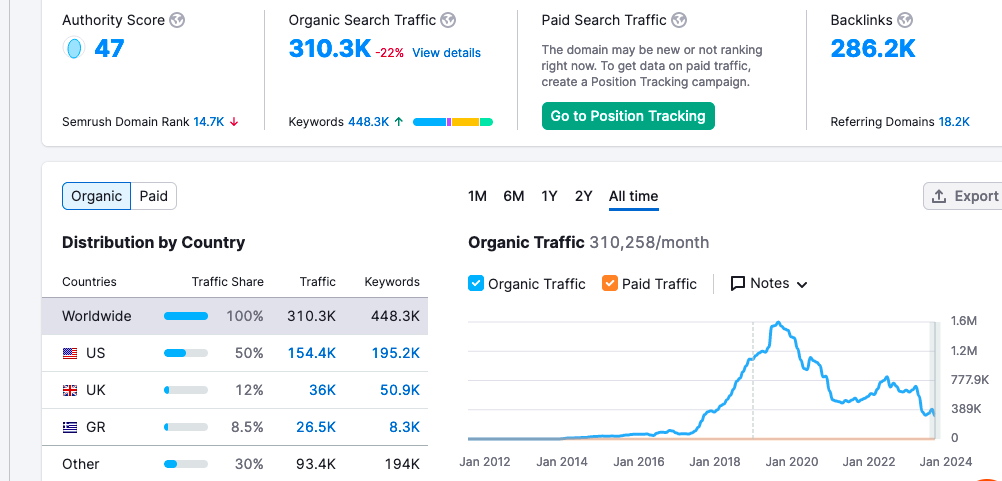Fair to say it’s been a rough few years for owners of travel sites. First we had the hammer blows of COVID lockdowns pretty much killing the demand for travel-related info like Car Hire and Hotel Bookings overnight.
Then we saw several successive Google updates take aim at broad travel content sites. No longer could you spin up a site about ATV riding and list all the best places around the world to ATV and expect to comply with EEAT guidelines. No, Google said, you should only make content on things you have experienced personally. Stick to ATV riding in Greece. Even better, one little island in Greece. Got it? Good.
Even that, for some publishers, was not enough. In the Helpful Content update from 2023, there seemed to be a heavy emphasis on unique, original and value-add content. As a Google helper pointed out to a penalized publisher in this Google Support Thread: “what makes the content superior?”. Dan Taylor wrote a good analysis of the impact of the Helpful Content update on travel sites over on his blog. There were both winners and losers as you’d expect.
Going back to EEAT, the recommendations were to share first-hand experiences of travel. That was the way to get your stuff to appear prominently in Google search. It seemed to work for some sites, for a while at least, as we can see from checking out the performance of websites like SantoriniDave.com.
In a related explanation post from Google Search Team in May 2023, the idea of ‘Perspectives’ was first stated, part of “a system that more deeply understands content created from a personal or expert point of view, allowing [Google] to rank more of this useful information on Search”. The idea, as stated, was to show travel content based on other people’s experiences.
While not the most aesthetic of websites, Santorini Dave is a genuine living legend when it comes to Santorini travel content. He’s lived it, done it, and reviewed it. 280,000 (mostly genuine) backlinks and a notable amount of branded traffic searches to his site directly would mean, on first glance, this is exactly the type of website Google would want to show visitors.
So let’s check it out:

What happened? The slow death of independent travel content websites is what happened. For whatever reason, the last few Google updates and the most recent March Updates have decided that SantoriniDave is not quite good enough. If that’s the case for travel websites of this caliber (again, ignoring design), what about those many travel sites on the smaller end?
Overall, it doesn’t seem viable in 2024 to have a travel website and expect to gain sustained, high traffic unless you’re one of the big players like TripAdvisor.
The future of travel blog sites in Google’s SGE
Doesn’t look good. On March 28, 2024, Google launched their new integrated travel offering into SGE (AI answers) – the ability to build travel guides for yourself by asking Google’s AI. To do that, it brings in multiple sources of data from websites, Maps, reviews and photos posted by people around the world.
Users can ask things like “plan me a four day trip to Washington D.C.”, and Google will reply back with some sightseeing, hotels, restaurants and attractions to visit. Naturally, it integrates Google Flights and Google Hotels for an end-to-end package ostensibly to keep you from clicking away to a third-party site.
The benefits for Google here are obvious- it gives them way more contextual data about user intent and buyer habits which syncs up with their ad platforms. It also keeps people from navigating away to third-party sites.
But the key piece for site owners, particularly travel site owners, is that Google’s SGE has been trained on their content. The content they were told to write about from a place of expertise, using real-life experiences and in a narrow focus. Often these libraries of content and recommendations have come from years of effort and thousands of dollars of outlay on travel, writers, and trips themselves.
Naturally, that’s led to some complaints among the SEO community.
What travel bloggers are faced with right now is an existential threat to their businesses, especially if they rely on organic traffic and programmatic earnings. SGE is being used to create generic travel advice, created by an AI who by default cannot have ever visited these places. This content, when SGE rolls out to the masses, will overtake those carefully curated and experienced travel blogs.
Where’s the traffic going?
We’ve talked about SGE a lot so far. To me it’s quite clear that’s where the majority of travel question queries are going in the near future. But given there are somewhere near 500m travel queries on Google per month from the top twenty topics alone, there’s a huge chunk of searchers still looking to go somewhere.
What has been noticed lately, especially by search gurus like Lily Ray, is that ‘official’ travel sites are rising in prominence and audience shares. Official local, state and national tourism sites run by government and tourist bodies like VisitIdaho-org and DiscoverHongKong-com are growing substantially.

It makes sense these sites have received boosts from the Trust part of EEAT, while big publishers and high authority domains are gobbling up other traffic on the Authority part. But, as some have pointed out, the quality, comprehensiveness and trustworthiness of official tourism sites are debatable.
A blogger is much more likely to give an honest and comprehensive opinion using real-world experiences. How likely is it, for example, that the official Visit Hong Kong site will spell out some of the risks of visiting Hong Kong, such as the risks of posting information critical of the government or making posts or public statements that could be considered critical of the government.
Final Thoughts
Setting aside some ‘teething problems’ with these SGE results – like the fact the auto-generated travel plans often wouldn’t work in practice, it points to a somewhat sinister trend for Google.
Those independent, small and medium publishers have danced along to the algorithm fiddle for update after update, often getting clobbered even when doing exactly what Google recommends. Now that content is being cannibalized and presented as Google’s own answers after training their LLM models on that exact same data they re-rank and de-populate from SERPs.
If you’re a travel blogger in 2024, expect some more pain in your organic traffic trends. Think about diversifying away to alternative search engines or developing direct relationships with your readers via social channels and newsletters.
Talking of newsletters…

With more than 20 years of publishing experience and formal study to an MA level, Adam is an expert in digital publishing strategies. Adam is the founder and lead consultant at Alphamorr, where he helps digital publishers and media groups to set and achieve their goals. Adam’s experience includes leading sales team in fast-growing organizations covering Adtech for some of the largest websites in the world & enterprise software deployed with world-leading organizations, both public and private.


No responses yet